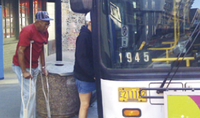Economy Drags on Transit, Service Suffers
Evan Manvel

The damage from the slow economy continues to grow. Battered by dips in ridership and lower payroll taxes, TriMet is cutting service to make up a $27 million hole. Some of the cuts hit low-ridership routes, but popular buses like the 6-MLK and the 14-Hawthorne are also being cut (by 11 and 9 percent respectively). Overall, TriMet is cutting service 5%, while hiking fares by a nickel. Browse the cut list at the interesting new publication Portland Afoot. Of course, these fare increases and service cuts aren't the first. Fares have increased 70% over the past decade, much faster than 27% overall inflation. Frequent service lines – which used to mean a bus at least every 15 minutes – now may provide service only every 20.
Why do we care? While most of the people on transit can drive instead, one out of every four people in the region cannot drive at all – they’re too poor, too sick, too old, too young. That’s about 400,000 people across the TriMet area who need transportation choices to access school, jobs, and everyday errands. They are mainly society’s most vulnerable. Beyond equity, transit has environmental benefits and health impacts. A recent Upstream Public Health study reminds us transit service improves health, as users often walk enough to and from transit to get their recommended daily exercise. This can cut cancer, cardiovascular disease, strokes, diabetes, and soforth.
What to do about the cuts? We could shrug our shoulders, like most of us have, whenever TriMet’s board decides its next move. Unlike people who drive or bike, people who take transit and walk are harder to organize to advocate for their interests. Large transit-heavy cities like New York have strong transit advocacy groups, but our advocacy efforts are spread among volunteers or groups with much broader missions. To their credit, OPAL Environmental Justice Oregon and the Amalgamated Transit Union are organizing around the transit cuts, tomorrow from 4 to 5:30 pm at SW Taylor and Park in Portland.
Hats off to those engaging in the debate. The difficult question we face is how much to increase revenue and how much to cut costs. As fares are only 21% of operating income (payroll taxes are 55%, interagency transfers and other revenue 24%), it’s hard to plug big holes using just fare increases. And while the 2009 Oregon Legislature approved giving TriMet the authority to gradually increase the payroll tax to a maximum of 0.8%, that’s unlikely to result in firm financial footing over the long term.
If laws allowed it, one could imagine taking the $4,000 million targeted for the CRC MegaBridge and creating a transit endowment, providing about $240 million a year, or more than half of TriMet’s operating budget. But laws don’t allow it. Similarly, we can’t raid capital monies dedicated to new rail construction for operational costs.
In terms of long-term solutions, I also find myself drawn to Bob Komives’ idea of transit service as a utility – that is, something that is “installed” at each home, like sewer or trash service. This funding model might be paired with using prepaid transit – that is, fareless transit – a topic I hope to explore more fully in another post.
There’s also the possibility of cutting costs. Like most organizations, most of the operational costs go to employees. As news outlets have detailed, TriMet has relatively generous benefits, a major cost – in fact, more money is spent on benefits than wages. Of course, health care costs from America’s outlier health care system are a major part of this – and are projected to be 36% of all its operating costs by 2030.
So, readers - how should we fund transit? What would you do in the current situation? Cut benefits, cut service, increase fares, and/or find some new long-term funding model?
As background, you might want to read a 2009 budget report from the TriMet Citizens Advisory Committee.
 |
More Recent Posts | |
Albert Kaufman |
|
Guest Column |
|
Kari Chisholm |
|
Kari Chisholm |
Final pre-census estimate: Oregon's getting a sixth congressional seat |
Albert Kaufman |
Polluted by Money - How corporate cash corrupted one of the greenest states in America |
Guest Column |
|
Albert Kaufman |
Our Democrat Representatives in Action - What's on your wish list? |
Kari Chisholm |
|
Guest Column |
|
Kari Chisholm |
|
connect with blueoregon



12:46 a.m.
Jun 11, '10
First of all I do not like things automatically posted to my face book page.
I actually do not like face book as it the information they have is shared with all sorts of parties that I have noT approved.
But since you require that I joined.
Here is my suggestion for transit funding:
STOP FUNDING THIS: http://www.costofwar.com/
AND FUND FREE TRANSIT FOR ALL AMERICANS!
12:00 a.m.
Jun 13, '10
Hey, thanks so much for the Portland Afoot shout, Evan! I'm overjoyed that it could contribute to a thoughtful post on this issue that's obviously close to my heart.
Our goal with the web side of this publication is to do exactly this: Be a link-worthy resource for bloggers and other folks who specialize in timeliness. We want to be your snap-on context when you want to do a post like this.
Which means, of course, that you should send me ideas for stuff to dig up: [email protected].